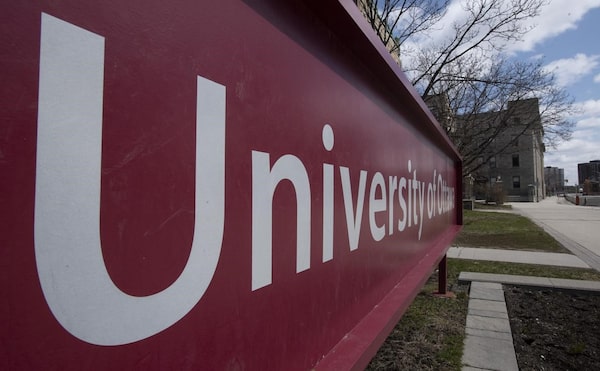
Thursday's report on academic freedom at the University of Ottawa says controversial speech should be analyzed on a case-by-case basis.The Canadian Press
A report on academic freedom at the University of Ottawa prompted in part by the outcry over a professor’s use of a racial slur in class says the university must make clear its commitment to intellectual inquiry and free expression, and oppose the exclusion of words, works or ideas.
But although the report, authored by a committee chaired by retired Supreme Court justice Michel Bastarache and released on Thursday, concludes that academic freedom should be protected, it cautions that this must not happen “at the expense of silencing marginalized people and groups.”
The report says controversial speech should be analyzed on a case-by-case basis. It recommends the university create a committee to review complaints and concerns related to freedom of expression or academic freedom. The committee would be empowered to investigate and impose penalties when necessary.
The report also calls for training for faculty on equity and diversity, and stronger protections against cyberbullying. And it recommends the university create an action plan to fight racism and discrimination.
University of Ottawa president Jacques Frémont told The Globe and Mail on Thursday he is committed to implementing the report’s recommendations.
The university was thrust into the spotlight a year ago when Verushka Lieutenant-Duval, a professor with expertise in art, was suspended for saying the n-word in class while explaining how some social groups had reappropriated words considered slurs. She said the word out loud in its entirety, and a student later objected. The case became a focal point, particularly in Quebec, for debates about whether it’s appropriate to impose limits on speech, particularly in a classroom.
Students and faculty were divided over whether the university had reacted appropriately. Some defended the professor because she did not appear to have intended harm, while others said she should not have used the word. Academic associations defended her on the grounds that her words were germane to the subject she was teaching, uttered in a class context and intended to instruct. The university soon lifted Prof. Lieutenant-Duval’s suspension.
“The campus was in turmoil, and rightly so, because people were wondering what the rules were, and what are the boundaries, and how should such cases be dealt with,” Mr. Frémont said. “The report equips us with more concrete means of dealing with similar issues involving academic freedom and human dignity, equality, diversity and inclusion.”
Mr. Frémont said he could not comment on the incident involving Prof. Lieutenant-Duval, because it is the subject of a workplace grievance. She could not be reached for comment Thursday.
In the report, Mr. Bastarache says he received submissions from people at the university who said they feel they must censor themselves to avoid public backlash.
Mr. Frémont said self-censorship is probably happening in some cases, and he called for it to end.
“Our faculty members should not self-censor. That’s crystal clear. Academic freedom is the basic soul, the foundation of universities. If we don’t have that, we’re dead,” he said.
But he added that professors should think carefully about how best to deal with sensitive topics. He said a university owes that much to its students.
Trudeau calls for end to University of Ottawa professor’s ‘Quebec bashing’
No, Quebec is not Canada’s Alabama
In March, 2021, another controversy erupted at the university when law professor Amir Attaran made comments on Twitter criticizing racism in Quebec. Quebec Premier François Legault and Prime Minister Justin Trudeau were eventually drawn into the resulting political firestorm, and there were calls from Quebec politicians for Mr. Frémont to discipline Prof. Attaran.
At the time, Mr. Frémont said he deplored the kind of highly polarizing public statements that had sparked the controversy, but he defended Prof. Attaran’s right to free expression.
Prof. Attaran on Thursday said Mr. Bastarache did not reach out to him for input.
But he said he was alarmed by one statement in the report.
Mr. Bastarache writes that several people consulted for the report argued that bilingualism should be considered a fundamental value of the university. The report says attacks on the university’s “linguistic makeup or the moral value of its Francophone or Anglophone components cannot, under current circumstances, be protected by freedom of expression.”
Prof. Attaran called that notion shocking.
“To somehow say that freedom of expression does not include offering a negative comment on the linguistic makeup [of the university], or moral value of these languages. This is grotesque. This is anti-intellectual,” he said.
Our Morning Update and Evening Update newsletters are written by Globe editors, giving you a concise summary of the day’s most important headlines. Sign up today.